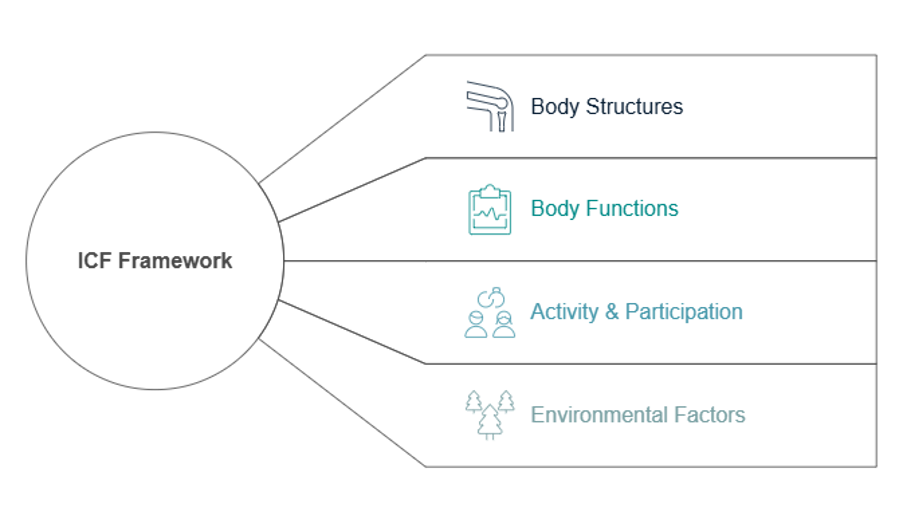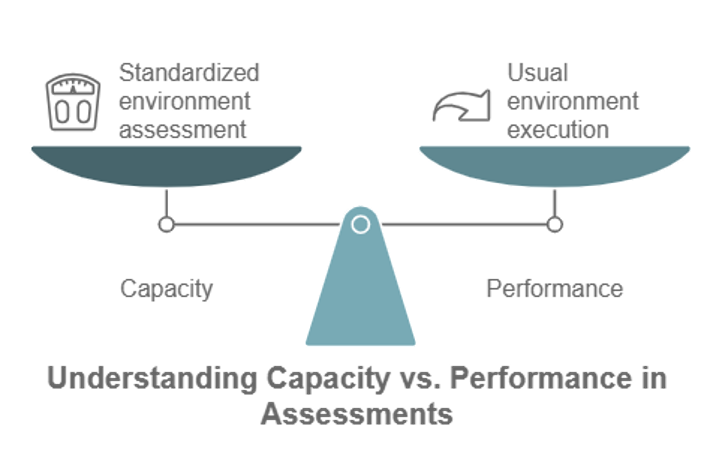Functional assessment in rehabilitation
Functional assessment is essential in rehabilitation goal setting as it provides a comprehensive understanding of a patient's abilities, limitations, and environmental influences. By thoroughly evaluating areas such as body functions, activities, participation, and contextual factors, clinicians can identify specific challenges and opportunities unique to each individual. This detailed insight ensures that goals are tailored to the patient’s current level of functioning, making them achievable, meaningful, and aligned with their personal priorities. Proper assessment not only enhances the relevance and effectiveness of rehabilitation plans but also fosters patient engagement, as goals rooted in a clear understanding of their capabilities and needs are more likely to inspire motivation and sustained effort.
The ICF
Kompass uses the International Classification of Functioning, Disability & Health (ICF) as the functional assessment within the platform. The ICF is a framework developed by the World Health Organisation (WHO, 2001) to standardise the description of a person’s functioning. Like other WHO frameworks (e.g., ICD, ICHI), the ICF organises over 1000 categories into core sets specific to conditions, such as Traumatic Brain Injury. These are divided into:
Brief Core Sets (e.g., 39 categories)
Comprehensive Core Sets (e.g., 139 categories) Non-specific core sets like ‘Generic’ and ‘Rehabilitation’ (7 and 30 categories respectively) can be used for quick assessments or limited timeframes.
Kompass incorporates core sets tailored to a wide range of rehabilitation services, covering healthcare areas such as stroke, cardiology, mental health, addiction services, orthopaedics, and respiratory care. These core sets are designed to address the unique needs of each field, enabling targeted assessments and personalized rehabilitation plans. They provide a structured approach to evaluating body structures, functions, activities, participation, and environmental factors, ensuring comprehensive patient care. These core sets are divided into:
Body Structures
Body Functions
Activity & Participation
Environmental Factors
This allows for a holistic assessment of a patient, taking into account the factors around them, their facilitators and barriers and the functional problems they are presenting with. This allows for tailored goal-setting based on unique client needs.

ICF codes
The ICF uses detailed codes to describe health and functioning systematically. Codes are organised into chapters and subcategories. For instance:
b1: Mental Functions
b110: Consciousness Functions
The ICF's comprehensive categorisation serves as a universal language for assessing health and disability across various settings. With over 1,000 categories covering body functions, activities, and environmental factors, it enables consistent evaluation, enhances communication among healthcare professionals, and supports personalised rehabilitation planning. This standardised framework also improves data collection and policy development, promoting a holistic approach to healthcare.
ICF scoring
The ICF uses a standardised scoring system:
0: No problem
1: Mild problem
2: Moderate problem
3: Severe problem
4: Complete problem
8: Not specified
9: Not applicable
This scoring system allows healthcare professionals to consistently evaluate a patient’s abilities and limitations, facilitating effective communication, goal-setting, and intervention planning across different healthcare settings.
Performance and capacity
This distinction identifies how environmental factors influence functioning and guides interventions to create supportive environments:
-
Capacity: What an individual can do in a standardised environment (e.g. clinical assessment).
-
Performance: What an individual does in their usual environment.
By comparing capacity and performance, healthcare professionals can better understand the impact of environmental factors and develop targeted strategies to enhance functioning and participation.

Functional problems
A functional problem refers to difficulties experienced in body functions, body structures, activities, or participation that impact an individual's ability to carry out daily tasks and engage fully in their environment. These challenges may arise from physical, cognitive, or psychosocial impairments, affecting areas such as mobility, self-care, communication, and social participation.
Functional problems are systematically recorded during ICF assessments to provide a comprehensive overview of a person’s health status and functional limitations. The ICF framework ensures that these issues are documented in a standardised manner, allowing healthcare professionals to identify key barriers and facilitators that influence an individual’s functioning.
In Kompass, these recorded functional problems can be accessed via the 'functional problems' tab, enabling clinicians to review, track, and address the specific needs of each patient. This information is crucial for setting realistic rehabilitation goals, monitoring progress, and developing tailored intervention plans that support improved quality of life and long-term well-being.
Facilitators and barriers

Facilitators and barriers significantly influence an individual’s ability to function and participate in daily life. Facilitators, such as supportive environments and assistive technologies, enhance participation, while barriers like physical obstacles and social stigma can hinder it. Recognising these factors helps in creating inclusive environments and effective interventions to support individual needs.
Getting started with the ICF
The Kompass platform offers a comprehensive ICF key designed to seamlessly guide you through scoring and assessments. To get started with the ICF in Kompass:
Familiarise yourself with the core sets:
Explore the various ICF core sets and identify which are most relevant to your field and practice. Understanding the core sets will help you efficiently categorise and assess functional areas.
Learn the ICF scoring key:
Gain a thorough understanding of the qualifiers used to assess each category. This includes learning how to interpret performance and capacity measures to provide accurate evaluations.
Utilize assessment tools:
Take advantage of the built-in tools within Kompass to streamline data collection, track patient progress, and generate comprehensive reports.
Collaborate with your team:
Engage with interdisciplinary teams to ensure a holistic approach to assessment and goal-setting, leveraging the ICF framework to align objectives across different care areas.
Stay updated with best practices:
Keep up-to-date with the latest developments in the ICF framework and how it applies to your specific area of expertise, ensuring your assessments remain accurate and effective.
Steps to Effective Rehabilitation
Objective Setting
Translating goals into actionable steps for progress.
Goal Setting
Creating structured, patient-centered goals to guide rehabilitation.
Identify Problems
Highlighting key areas requiring intervention based on the assessment.
Functional Assessment
Establishing a comprehensive understanding of the patient's abilities and limitations.